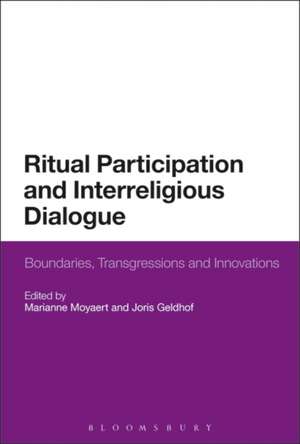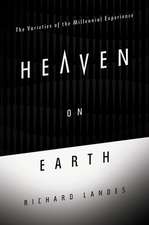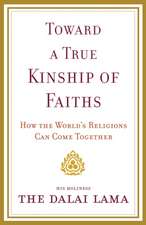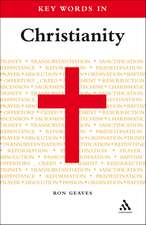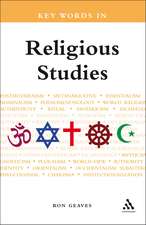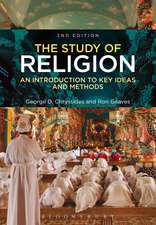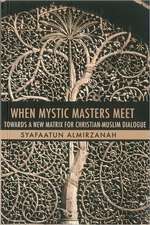Ritual Participation and Interreligious Dialogue: Boundaries, Transgressions and Innovations
Editat de Marianne Moyaert, Joris Geldhofen Limba Engleză Paperback – 19 oct 2016
| Toate formatele și edițiile | Preț | Express |
|---|---|---|
| Paperback (1) | 257.97 lei 43-57 zile | |
| Bloomsbury Publishing – 19 oct 2016 | 257.97 lei 43-57 zile | |
| Hardback (1) | 774.46 lei 43-57 zile | |
| Bloomsbury Publishing – 22 apr 2015 | 774.46 lei 43-57 zile |
Preț: 257.97 lei
Preț vechi: 331.42 lei
-22% Nou
Puncte Express: 387
Preț estimativ în valută:
49.36€ • 51.67$ • 41.09£
49.36€ • 51.67$ • 41.09£
Carte tipărită la comandă
Livrare economică 31 martie-14 aprilie
Preluare comenzi: 021 569.72.76
Specificații
ISBN-13: 9781350012370
ISBN-10: 1350012378
Pagini: 272
Dimensiuni: 156 x 234 x 15 mm
Greutate: 0.39 kg
Ediția:NIPPOD
Editura: Bloomsbury Publishing
Colecția Bloomsbury Academic
Locul publicării:London, United Kingdom
ISBN-10: 1350012378
Pagini: 272
Dimensiuni: 156 x 234 x 15 mm
Greutate: 0.39 kg
Ediția:NIPPOD
Editura: Bloomsbury Publishing
Colecția Bloomsbury Academic
Locul publicării:London, United Kingdom
Caracteristici
The first volume to focus on the lived dimension of ritual in interreligious and interfaith studies, rather than purely cognitive or ethical questions
Notă biografică
Marianne Moyaert is Professor and Chair of Comparative Theology and the Hermeneutics of Interreligious Dialogue at the VU University Amsterdam, the Netherlands. She is also guest lecturer at the KU Leuven, Belgium, teaching Jewish-Christian Relations. Joris Geldhof is Professor of Liturgical Studies and Sacramental Theology at the Faculty of Theology and Religious Studies, KU Leuven, Belgium. He is the director of the Liturgical Institute in Leuven, Belgium.
Cuprins
1. Introduction: Exploring the Phenomenon of Interreligious Ritual Participation, Marianne Moyaert Part I: Philosophical, Theological and Phenomenological Observations 2. On Doing What Others Do: Intentions and Intuitions in Multiple Religious Practice, S. Mark Heim (Andover Newton Theological School, USA)3. Bowing before Buddha and Allah? Reflections on Crossing over Ritual Boundaries, Maria Reis Habito (Elijah Interfaith Institute, USA) 4. Enlightened Presuppositions of (Spiritually Motivated) Cross-Ritual Participation, Walter Van Herck (University of Antwerp, Belgium) 5. Religion Is as Religion Does: Interfaith Prayer as a Form of Ritual Participation, Douglas Pratt (University of Birmingham, UK)6. Interreligious Ritual Participation: Insights from Inter-Christian Ritual Participation, Martha Moore-Keish (Columbia Theological Seminary, USA)Part II: Muslim and Christian-Muslim Perspectives 7. Receiving the Stranger: A Muslim Theology of Shared Worship, Timothy Winter (Wolfson College, Cambridge, UK) 8. Interreligious Prayer between Roman Catholic Christians and Muslims, Gavin D'Costa (University of Bristol, UK)9. Back-and-Forth Riting: The Dynamics of Christian-Muslim Encounters in Shrine Rituals, Bagus Laksana (Sanata Dharma University in Yogyakarta, Indonesia)Part III: Christian and East Asian Religious Perspectives 10. Offering and Receiving Hospitality: The Meaning of Ritual Participation in the Hindu Temple, Anantanand Rambachan (Saint Olaf College, USA)11. Towards an Open Eucharist, Richard Kearney (Boston College, USA)12. The Practice of Zazen as Ritual Performance, André van der Braak (VU University Amsterdam, The Netherlands)13. Theorizing Ritual for Interreligious Practice, James W. Farwell (Virginia Theological Seminary, USA)Part IV: Jewish and Jewish-Christian Perspectives 14. Transgressing and Setting Ritual Boundaries: A Puzzling Paradox, Rachel Reedijk (VU University Amsterdam, The Netherlands)15. Mourning the Loss of My Daughter: The Failure of Inter-Faith Bereavement Rituals, Anya Topolski (Centre for Ethics, Social and Political Philosophy, Belgium)16. Parameters of Hospitality for Interreligious Participation: A Jewish Perspective, Ruth Langer (Boston College, USA)17. Epilogue: Inter-riting as a Peculiar form of Love , Joris Geldhof (Catholic University of Leuven, Belgium)BibliographyIndex
Recenzii
Ritual, Participation and Interreligious Dialogue is a superb collection of essays addressing with boldness and acuity three turns in modern theology and the study of religion: the turn to religious practice in all its forms as a topic of study, attention to what people actually do, as distinct from theologies and rules about what ought to happen; sensitivity to the interplay of practice and theology, each influencing the other; [and] a new sensitivity to the phenomenon of interreligious participation in religious practice . this timely and valuable volume helps us to move forward in addressing a key phenomenon of this century.
In this important book, contributors from many parts of the world and of different faiths share their experiences and reflections.
Moyaert and Geldhof are to be congratulated on bringing together a timely and excellent volume on the topic of ritual participation. Covering theoretical and theological issues as well as case studies from a range of traditions and global perspectives it really will be a landmark work in this area. Scholars and students in interreligious studies and cognate fields will be using this volume for its insights and building upon it for further research for many years, if not decades, to come. The range of perspectives and the depth of analysis and insight contained in its pages are what make it stand out as a contribution towards what is still a young and underexplored field, and will set a very high benchmark for anyone following in their wake.
A superb collection of critical reflections on the possibility and limits of interreligious ritual participation. It provides an excellent complement to the work that is ongoing in the area of interreligious studies.
In this important book, contributors from many parts of the world and of different faiths share their experiences and reflections.
Moyaert and Geldhof are to be congratulated on bringing together a timely and excellent volume on the topic of ritual participation. Covering theoretical and theological issues as well as case studies from a range of traditions and global perspectives it really will be a landmark work in this area. Scholars and students in interreligious studies and cognate fields will be using this volume for its insights and building upon it for further research for many years, if not decades, to come. The range of perspectives and the depth of analysis and insight contained in its pages are what make it stand out as a contribution towards what is still a young and underexplored field, and will set a very high benchmark for anyone following in their wake.
A superb collection of critical reflections on the possibility and limits of interreligious ritual participation. It provides an excellent complement to the work that is ongoing in the area of interreligious studies.
